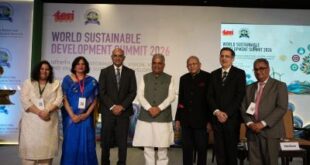India’s educational landscape has significantly expanded, with the Gross Enrollment Ratio (GER) in higher education steadily rising. Yet, this growth contrasts sharply with employability rates; in 2024, only 52.3% of fresh graduates met industry employability standards, a modest 2% increase from the previous year. Particularly concerning is the employability rate of 63.6% within the highly skilled demographic of 22-25-year-olds, indicating a considerable gap between academic qualifications and job market requirements.
This disparity highlights a crucial flaw in the educational model, focusing excessively on theory rather than practical skills needed in a rapidly evolving workplace. Degree apprenticeships offer a promising solution, blending academic learning with vocational training to better prepare India’s youth for industry demands. This approach not only addresses the current skills gap but aligns education more closely with economic needs and job market realities.
Why apprenticeships are becoming a paramount prerequisite
In light of the profound skills gap and the underutilization of apprenticeships in India, it’s imperative to reevaluate and reinforce the framework for vocational education and training. Only 45% of Indian graduates who apply for jobs are employable, with the readiness to meet industry’s fast-changing demands, according to the ‘India’s Graduate Skill Index.’ It is truly a stark reflection of the skills gap plaguing the workforce. The Global Skills Gap Report 2019-20 highlighted that 92% of Indian employees acknowledged the skills mismatch within the country. About 4 years later, many would think there should be a change, right? Well, the India Skill Report 2023 just strengthened the narrative, with 70% of businesses across industries acknowledging a skill gap in their employees. Despite India’s vast potential to host up to 15 lakh apprentices, mirroring the 3-4% participation rate seen in evolved economies, current engagement sits at a paltry 0.1%. This equates to only 25,000 employers out of 6.3 crore enterprises actively participating with around 4 lakh apprentices, demonstrating a critical need for strategic intervention to bridge intent with action.
In addressing the widening chasm between educational accomplishments and workforce readiness among India’s youth, it becomes evident that traditional educational paradigms are falling short in preparing students for the realities of the job market. A transformative shift in mindset is illuminated by a report from LinkedIn, where over 80% of Indian professionals assert that, in contrast to two decades ago, skills now eclipse degrees in importance for career advancement. This paradigm shift is further underscored by the revelation that 76% of Indian professionals perceive degrees to have diminished in value, attributing this to an increasing inclination towards skills-based hiring. Notably, 82% acknowledge a growing comfort among companies in recruiting candidates without relevant work experience, provided they possess the requisite skills. This underscores an urgent need for educational models that prioritise skill acquisition and continuous learning, with 87% of professionals emphasising the heightened importance of upskilling.
Amidst this backdrop, apprenticeships emerge as a critical solution, bridging the gap between theoretical knowledge and the practical skills essential for the modern workplace. They offer a unique blend of hands-on experience and a deep dive into industry-specific demands, thereby elevating employability and career readiness among India’s youth. The impact of apprenticeships is not just theoretical; it is supported by tangible outcomes. A recent survey in India revealed that over 65% of employers view apprenticeships as a cost-effective talent development strategy, echoing the sentiment that apprenticeships are pivotal in honing and augmenting the skills of emerging professionals. This view is bolstered by research from Harvard Business School, which notes the dual benefits of acquiring valuable skills and securing a pathway into employment, with approximately 75% of employers willing to recruit their trainees post-completion.
The tripartite model creates a perfect trifecta
The tripartite model, which brings together academia, industry, and apprentices, stands as a foundational pillar in closing the gap between education and employment through degree apprenticeships. This collaboration offers a unique set of advantages across the board. For academic institutions, it presents an opportunity to closely align curriculums with the evolving demands of the job market, ensuring education remains both relevant and impactful. Industries, on the other hand, find in degree apprenticeships a direct channel to cultivate their future workforce, significantly reducing recruitment costs and skill shortages, thereby enhancing economic growth and competitiveness. Meanwhile, apprentices gain access to career paths that might previously have seemed unreachable, acquiring practical skills and industry-specific knowledge that elevate their employability and career prospects. This model doesn’t just connect theoretical knowledge with practical application; it prepares a workforce that is adaptable, skilled, and primed for the future challenges of the global job market.
The NEP 2020 is a pathway that encourages degree apprenticeships
The integration of work-integrated learning programs within the framework of India’s National Education Policy (NEP) 2020 marks a significant stride towards reconciling the disconnect between educational qualifications and employability. The NEP’s emphasis on blending vocational training with academic education addresses the critical flaws inherent in an education system that traditionally prioritizes qualifications over practical skills. This policy initiative underlines the importance of fostering a learning environment where practical, hands-on experience complements theoretical knowledge, thereby narrowing the gap between education and real-world employability. Specifically, the NEP 2020 advocates for a more fluid integration of vocational and academic streams, enabling students to acquire the technical skills and practical experiences that are increasingly demanded by employers. This approach not only enhances the employability of graduates but also ensures that the education system is more aligned with the evolving needs of the economy, preparing a workforce that is versatile, skilled, and ready to tackle the challenges of the future.
Degree apprenticeships are the way forward
In light of the potential that degree apprenticeships hold for enhancing the employability of India’s youth and improving the GER, it is imperative to prioritize these programmes within the ambit of the NEP 2020. To effectively implement degree apprenticeships, the inclusion of a dedicated Higher Education body within the Apprenticeship Act is essential, serving as a pivotal third party with a clearly defined role. Furthermore, the establishment of industry bodies aligned with the University Grants Commission (UGC) Guidelines for Apprenticeship Embedded Degree Programmes (AEDP) will significantly bolster the collaboration between academia and industry, ensuring that the curriculum is responsive to the needs of the job market.
The introduction of an apprenticeship Credit Framework, mirroring the structure and intent of the National Skills Qualification Framework (NSQF) and the National Qualification Framework (NQF), is vital. Such a framework would enable the seamless integration of apprenticeship experiences with higher education, facilitating a more fluid and flexible pathway for apprentices to gain both academic credentials and practical, work-based learning.
Embracing these measures within the NEP 2020 framework will not only bridge the existing gap between education and employability but also ensure that India’s future workforce is equipped with the skills, knowledge, and practical experience needed to thrive in the global economy. The time to act is now. By fostering a more inclusive and integrated approach to education and vocational training, we can unlock the full potential of our youth and pave the way for a more prosperous and sustainable future.
 Newspatrolling.com News cum Content Syndication Portal Online
Newspatrolling.com News cum Content Syndication Portal Online






